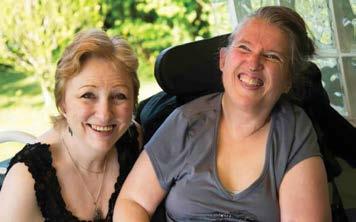
6 minute read
NEW LAW
Sara Pon and Krista James
Care Facility Admission and Capacity
On November 4, 2019, new legislation came into force laying out how consent must be obtained for a person to be admitted to a care facility (Part 3 of the Health Care (Consent) and Care Facility (Admission) Act, RSBC 1996 c 181 and the accompanying Health Care Consent Regulation, BC Reg 20/2000).
The consent requirements apply to long-term care facilities, short-term respite, and hospice, among other types of care facilities, but do not apply to acute care, assisted living, or involuntary mental health admission. Consent Process There are three ways a person can be admitted to a care facility. 1. If an adult is capable, he or she must consent. 2. If the adult is not capable of providing that consent, a substitute decision-maker must consent. 3. An adult may be admitted on an emergency basis without prior consent in specific circumstances, as discussed below.
Before an adult or substitute decision-maker can consent to care facility admission, the decisionmaker must be provided with all the information needed to make an informed decision about that specific facility, including the care and services offered and when the adult can leave.
The care facility staff must accommodate the adult’s communication needs and abilities and allow time for questions. The adult can have a supporter to help make that decision. Consent must be voluntary; the adult must not feel any pressure or influence to make the decision.
Consent does not have to be in writing. Consent can be verbal or inferred from behaviour if the adult cannot communicate verbally. Care facilities must keep a record of the consent to admission, along with any incapability assessments.
It is important to note that consent to admission is not equivalent to advance consent to all health care provided within the facility. Consent by the appropriate person is required for all health care treatment not covered by a care plan that has also received proper consent. Some adults who are not able to consent to admission may still be capable of consenting to medication or other health interventions. Emergency Admission An adult can only be admitted on an emergency basis without consent, in two circumstances.
1.
2. If the adult is not capable of making this decision and there is a serious danger to the adult or another person.
A designated agency has admitted an incapable adult who is being abused or neglected (under section 59 of the Adult Guardianship Act,
RSBC 1996 c 6).
Within 72 hours of an emergency admission, an incapacity assessment must be conducted and consent must be obtained from the adult or substitute decision-maker. Capacity For care facility admission, like other health care decisions, all adults are presumed capable. Even if an adult does not have capacity to make financial decisions or has an attorney under a Power of Attorney, the adult may still be capable of consenting to entering a care facility. An adult is capable of deciding whether to enter a care facility if the adult understands the relevant information and how this information would apply to the adult’s own life.
If the care facility manager reasonably believes the adult may not be capable of making this decision, and has made reasonable attempts to get consent from the adult, the manager must get an incapacity assessment. The assessment must be conducted by a listed health care professional such as a doctor, nurse, psychologist, or social worker. Substitute Consent If the incapacity assessment finds the adult is not capable of making the care facility admission decision (or the adult has a personal guardian appointed by the Court), the substitute decision-maker must give consent.
The Act lays out who can give consent in a ranked list. 1. A personal guardian 2. A representative appointed under a section 9 Representation
Agreement (also called a non-standard agreement) authorized to make an admission decision (neither a section 7
Representation Agreement (standard) or a Power of
Attorney document allows the representative/attorney to make a care facility admission decision) 3. A ranked list of family members:
Spouse, child, parent, sibling, grandparent, grandchild, anyone related by birth or adoption, a close friend, or a person immediately related by marriage 4. The Public Guardian and Trustee
The substitute decision-maker must have been in contact with the adult in the last 12 months and not have had any disputes. If not, the facility must get consent from someone else.
The substitute decision-maker has several responsibilities. 1. Must consult with the adult and any friend or family who wishes to give input. 2. Must decide whether admission would be in the best interests of the adult. That requires examining what the adult would want (a factor but not determinative), whether the adult would benefit from living at that facility and whether there are other less restrictive options.
If the care facility manager believes the substitute decisionmaker is abusing or harming the adult, the manager must report that to a designated agency. The designated agencies are the five health authorities, Community Living BC, and Providence Health.
Requests to Leave
If a capable adult wishes to leave the care facility, the adult must be allowed to leave. If the adult wants to leave and the care facility manager believes the adult is not capable of making that decision, an incapacity assessment must be conducted. If the adult is found to be incapable, a substitute decision-maker must decide whether the adult leaves the care facility. The care facility manager does not need to get an incapacity assessment or obtain consent from a substitute decision-maker if the adult has requested to leave within the last 90 days or entered the facility within the last 30 days.
2019 Canadian Elder Law Conference
The Conference featured a panel discussion outlining the new care facility admission laws in BC. The panel was moderated by Justice Eileen Gillese of the Ontario Court of Appeal.
The Panelists
Penny Washington, Norton Rose Fulbright Canada LLP • Scott Wingrove, Manager,
Strategic Policy, Seniors Services
Division, BC Ministry of Health • Jane Meadus, Advocacy Centre for the Elderly
The Conference will be replayed in 2020. Contact the Continuing Legal Education Society of BC for details. www.cle.bc.ca Further Learning The Ministry of Health has published some resources to help health care professionals to better understand the new provisions. • Practice Guidelines for Seeking
Consent to Care Facility
Admission: www2.gov.bc.ca/assets/gov/ health/accessing-health-care/ finding-assisted-living-residentialcare-facilities/practice_guidelines_ for_seeking_consent_to_care_ facility_admission.pdf • Consent to Care Facility
Admission: A Quick Guide: www2.gov.bc.ca/assets/gov/health/ accessing-health-care/findingassisted-living-residential-carefacilities/consent_to_care_facility_ admission_quick_guide.pdf • An online eLearning course titled Consent to Care Facility
Admission in British Columbia:
A Course for Managers and
Assessors is available to everyone on the Provincial Health
Services Authority Learning Hub.
You can self-register after setting up a LearningHub account: accounts.learninghub.phsa.ca/
Account/Register Elder Law Series The CCEL will be writing a series of articles on elder law topics for the 2020 issues of The Scrivener. The Summer article will discuss capacity for health care, personal, and financial decisions, supported decision-making, and planning documents. s Krista James is the CCEL National Director. Sara Pon is a CCEL Legal Research Assistant.










